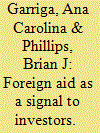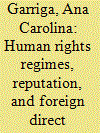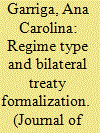|
|
|
Sort Order |
|
|
|
Items / Page
|
|
|
|
|
|
|
| Srl | Item |
| 1 |
ID:
186863


|
|
|
|
|
| Summary/Abstract |
The ability to finance conflict likely affects the odds of sustaining a war and succeeding in it. Recent literature explores rebel group funding, but far less is known about how states finance their own war efforts. This article posits that the design of central banks should affect civil war termination. In particular, it argues that central bank independence affects civil war termination through two channels. First, financial markets consider central bank independence as a good signal in terms of macroeconomic stability and debt repayment. In this way, independent central banks enhance the ability of the government to access credit to finance and end a civil war. Second, central bank independence is associated with lower inflation. Inflation control reduces one source of additional grievances that the civil war may impose on citizens. On a sample of civil wars between 1975 and 2009, central bank independence is associated with a substantial increase in the likelihood of war termination. When the form of termination is disaggregated, (higher) central bank independence is associated with a higher probability of government victory, relative to continued conflict and to other outcomes. Additional tests provide support for the argued mechanisms: during civil wars, countries with more independent central banks access international credit markets in better conditions – i.e. they pay lower interest rates, and receive longer grace and maturity periods on new debt. Furthermore, in countries experiencing civil wars, central bank independence is associated with lower inflation.
|
|
|
|
|
|
|
|
|
|
|
|
|
|
|
|
| 2 |
ID:
128982


|
|
|
|
|
| Publication |
2014.
|
| Summary/Abstract |
Does development aid attract foreign direct investment (FDI) in post-conflict countries? This article contributes to the growing literature on effects of aid and on determinants of FDI by explaining how development aid in low-information environments is a signal that can attract investment. Before investing abroad, firms seek data on potential host countries. In post-conflict countries, reliable information is poor, in part because governments face unusual incentives to misrepresent information. In these conditions, firms look to signals. One is development aid, because donors tend to give more to countries they trust to properly handle the funds. Our results show that aid seems to draw FDI-however, this is conditional on whether the aid can be considered geostrategically motivated. We also show that this effect decreases as time elapses after the conflict. This suggests that aid's signaling effect is specific to low-information environments, and helps rule out alternative causal mechanisms linking aid and FDI.
aid
|
|
|
|
|
|
|
|
|
|
|
|
|
|
|
|
| 3 |
ID:
146191


|
|
|
|
|
| Summary/Abstract |
What are the effects of international human-rights regimes on foreign direct investment (FDI)? Existing scholarship generally suggests a negative relationship between human-rights violations and FDI. Furthermore, research shows that international regimes can have effects on third parties such as non-member countries and other nonstate actors. However, it remains unclear how a country’s participation in human-rights regimes could affect investors’ decisions. I argue that host country participation in human-rights regimes provides a “reputational umbrella” for investors and therefore positively affects FDI. This effect proves stronger in countries with poor human rights records. Interestingly, investors appear not to punish human-rights violations if the state is a party to many human-rights regimes. Empirical analyses on a sample of 135 developing countries, from 1982 to 2011, provide support for the existence of these direct and indirect effects. The findings help to disentangle reputational effects from other possible causal mechanisms. Results are robust to various model specifications, including tests for endogeneity and reverse causality.
|
|
|
|
|
|
|
|
|
|
|
|
|
|
|
|
| 4 |
ID:
091611


|
|
|
|
|
| Publication |
2009.
|
| Summary/Abstract |
How does domestic regime type affect bilateral cooperation, and one of its most visible manifestations, bilateral treaties? This article explains how domestic political regime affects bilateral cooperation and, contrary to the expectations of some scholars, why autocracies should be expected to be more likely than democracies to enter into bilateral treaties. If the preferences of a pair of states are not identical, the sets of agreements that each party would consent to (win-sets) need to overlap for a bilateral treaty to be acceptable. Because additional domestic constraints reduce the size of a country's win-set, autocracies should have broader win-sets than democracies. Therefore, autocratic dyads should be more likely to formalize bilateral treaties than other pairs of states. Based on an original data set, I present empirical evidence showing that pairs of autocracies are more likely than other pairs of states to enter into agreements formalizing bilateral cooperation.
|
|
|
|
|
|
|
|
|
|
|
|
|
|
|
|
|
|
|
|
|